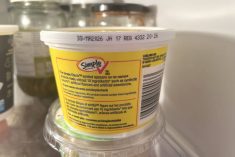“I don’t think anyone can see this footage and feel good about this production system.”
– WAYNE PACELLE
An undercover investigation by the Humane Society of the United States of major U. S. egg producers showed “rampant abuse” of hens, which the animal rights group said April 7 could prompt more consumers to embrace “cage-free” methods of production.
Footage collected in February and March by the group showed birds stuck in cages unable to reach food or water; dead hens, some of them rotting, amongst live birds; and manure pits that in at least one case had not been cleaned for two years.
Read Also

Tie vote derails canola tariff compensation resolution at MCGA
Manitoba Canola Growers Association members were split on whether to push Ottawa for compensation for losses due to Chinese tariffs.
“I don’t think anyone can see this footage and feel good about this production system,” Wayne Pacelle, president of the Humane Society of the United States, told reporters.
He urged Agriculture Secretary Tom Vilsack to take a “serious look at our footage.” The U. S. Agriculture Department could not be reached for comment.
The Humane Society has played an increasingly active role in pressuring industry in several states to end livestock practices it considers cruel.
In 2008, the group won wide media play with video showing workers at a California plant forcing sick and injured cattle into a slaughterhouse. The plant later recalled 143 million pounds of meat, the largest U. S. meat recall ever.
The case was instrumental in moving USDA to implement a rule banning all cattle too sick or injured to walk from entering U. S. slaughterhouses.
In the egg production probe, the group sent an investigator to facilities in Iowa owned by Rose Acre Farms and Rembrandt Enterprises, the nation’s second-and third-largest egg producers. There were about 10 million birds at the facilities that were investigated.
In most cases, the birds were housed in cages much smaller than a size of standard paper, which is common in the industry, according to the group. About 95 per cent of egg-laying hens are housed in confined cages.
Rose Acre executive vice-president Tony Wesner said in an interview his firm takes “animal welfare very seriously” and has all employees, including the
Humane Society worker, sign an agreement requiring them to report signs of animal abuse.
“Unfortunately that didn’t happen,” he said, referring to the Humane Society employee. “We’ll just have to take this and look at it some more and deal with it.”
Efforts by the Humane Society and others to shift toward cage-free production are gaining traction with several states, including California, passing restrictions on egg production.
National restaurant chains, most recently Subway, have committed to using cage-free eggs and retail giant Wal-Mart confirmed earlier this year eggs sold under its private label are cage free.
The animal rights group debunked producers who have
been reluctant to publicly embrace cage-free production methods.
“These same producers are producing cage-free eggs by the millions to account for the growing demand for these products,” said Pacelle. “We’re not talking about a pie-in-the-sky alternative.”
To see the video, go to: http://www.humanesociety.org/.














